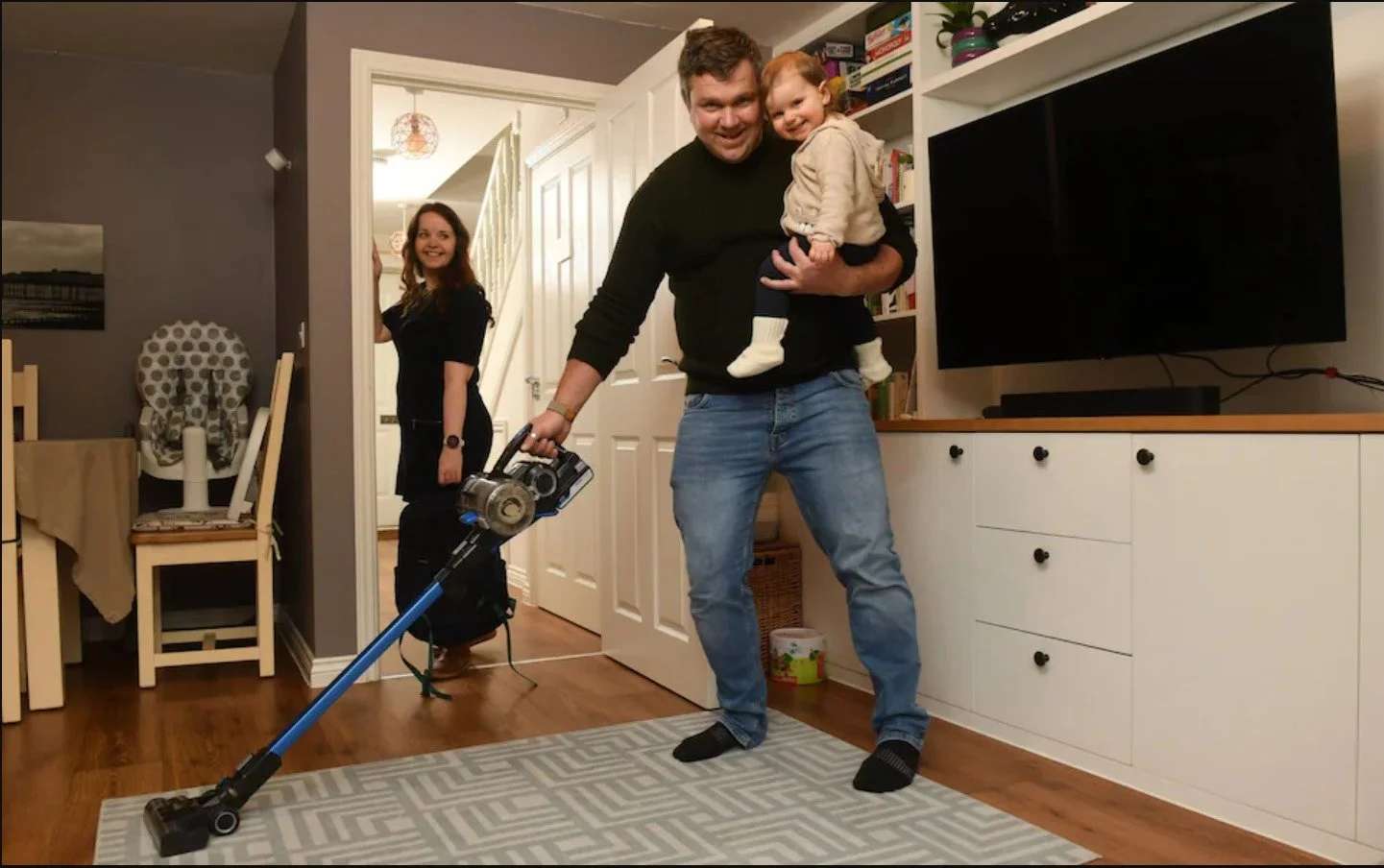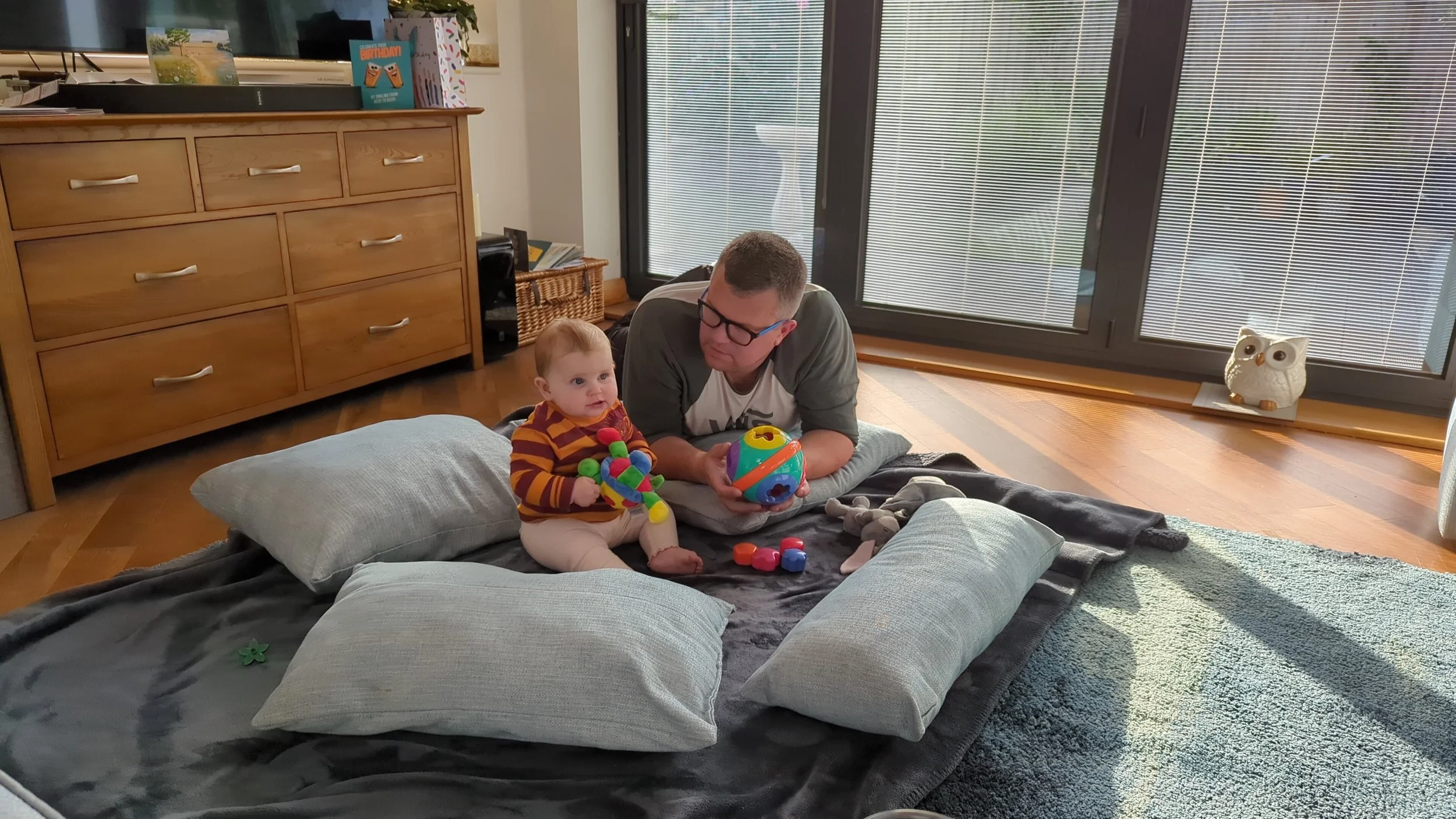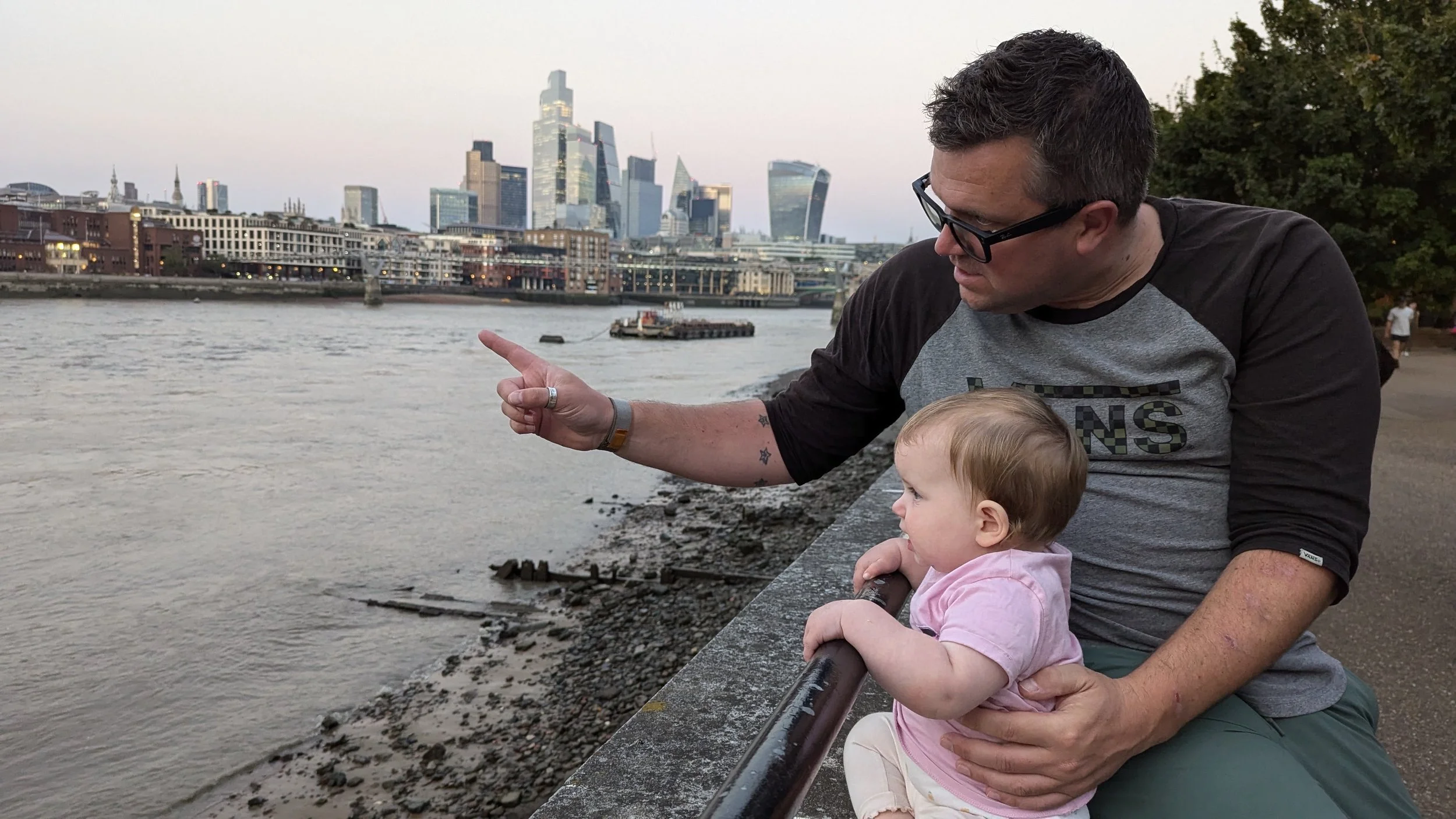Dad Mental Health: The Side of Parenting No One Talks About
The honest truth about stay-at-home dad mental health that nobody prepares you for
Being a stay-at-home dad is easily one of the greatest joys of my life, but it's also one of the quietest emotional journeys I've ever experienced.
When Lily and I have those magical moments — her hand in mine, her little giggle echoing through the house, the way she reaches for me when she needs comfort — it feels like my heart might just burst with joy. These are the moments I left my career as a Mercedes mechanic for. These are the moments that make it all worthwhile.
But there are other days too. Days where the walls feel closer, the house feels louder, and I feel… well, simply a bit lost and overwhelmed.
And if you're a dad reading this right now nodding your head, you need to know: you're not alone, and what you're feeling is completely valid.
The Hidden Mental Load Fathers Carry
No one really prepares dads for the mental load of stay-at-home parenting. The constant switching between chef, cleaner, emotional coach, entertainer, organiser, safety officer, and human climbing frame (and more recently, cheese-fetching servant at Lily's beck and call).
The pressure to "keep it all together." The expectation that you should just naturally know what you're doing. The loneliness you sometimes feel even though a tiny human is literally glued to your shadow from morning until night.
Stay-at-home dad mental health is rarely discussed, but it's something we desperately need to talk about more openly.
What the Mental Load Actually Looks Like
It's not just about the visible tasks — the nappies, the meals, the endless cleaning up of toys only for them to be pulled out again five minutes later. It's the invisible work that weighs on you:
The constant vigilance: Always being alert, always watching for dangers, always trying to be one step ahead of potential disasters
The decision fatigue: What's for lunch? Which activities today? Is she warm enough? Too warm? Should we go out or stay in?
The emotional regulation: Managing not just your child's big feelings, but your own frustration, exhaustion, and occasional resentment
The planning and organising: Doctor appointments, meal planning, social schedules, and developmental milestones to track
The identity struggle: Wrestling with who you are now that you're no longer "David the mechanic" but "Lily's dad"
PLEASE don't get me wrong — I know mums and nanas may read this and think, "Silly bloke, a woman's work is never done!" And I understand this now more than ever. If my odd-shaped head could wear a hat, I'd be taking it off to you all constantly.
Mothers have been carrying this load forever, often while also working paid jobs. I'm not claiming dads have it harder — I'm simply saying we need to talk about it too. Mental health struggles don't discriminate, and silence helps no one.
The Loneliness No One Talks About
Here's something I wish someone had told me before I became a stay-at-home dad: you can feel profoundly lonely even when you're never physically alone.
Sometimes, when Lily finally naps (if I'm lucky), I catch my breath and realise I haven't had a real adult conversation all day. The deepest discussion I've had involved debating whether teddy or bunny should sit next to her at lunch.
The isolation is real:
Most baby groups and toddler classes are attended by mums, and while many are welcoming, you and I are still normally the only man in the room
Your work mates have moved on without you, trading stories you're no longer part of
Your partner comes home exhausted from their day, and you're exhausted from yours, leaving little energy for real connection
Social media shows everyone else's highlight reels while you're just trying to get through the day
I've documented our journey on my YouTube channel partly to combat this isolation — to connect with other dads navigating the same path, to build community where there often isn't one. Over 60,000 people have joined our journey, and that community has been a lifeline on the hard days.
The Emotional Toll of Always Being "On"
There's no clocking out. No lunch break where someone else takes over. No sick days. When you wake up at 5:30 AM to a toddler soon demanding breakfast, your shift has started — and it doesn't end until bedtime, and sometimes not even then.
The relentlessness is exhausting in ways that aren't visible.
Some evenings, when the house finally quietens and Lily's asleep, the tiredness hits deeper than just physical. It's an emotional exhaustion that seeps into your bones. It's the weight of being someone's entire world, of carrying the responsibility for another human's safety, development, and happiness.
And on those evenings, it's easy to wonder: Am I doing enough? Am I doing this right? Am I failing somehow?
The Pressure to Be the "Perfect" Dad
Here's the truth that took me too long to learn: Perfect dads don't exist.
We see curated Instagram posts of dads doing elaborate crafts with their kids, taking them on amazing adventures, never losing their patience, always smiling. We compare our behind-the-scenes chaos to everyone else's highlight reel.
But perfection isn't the goal — presence is.
Remember, on the days where:
The only activity was watching Bluey on repeat
Lunch was the same as yesterday (again)
You raised your voice when you didn't mean to
The house looks like yet another tornado hit it
You felt more frustration than joy
You're still a good dad. You're still doing your best. And on the hardest days, simply keeping your child safe, fed, and loved is more than enough.
I know I'm doing my best — and that counts for so much. But on the tough days, I have to actively remind myself of this truth.
Dad Mental Health: Recognising When You're Struggling
It's crucial to recognise the difference between normal hard days and signs of something deeper.
Normal Hard Days Look Like:
Occasional frustration or feeling overwhelmed
Temporary loneliness that passes
Missing your old life sometimes
Feeling tired and touched-out by bedtime
Needing breaks and alone time
Warning Signs You Might Need Support:
Persistent feelings of emptiness or sadness that don't lift
Loss of interest in things you used to enjoy, including time with your child
Irritability or anger that feels out of proportion or constant
Difficulty bonding with your child or feeling emotionally disconnected
Thoughts of escape or harming yourself
Physical symptoms like constant fatigue, headaches, or changes in appetite
If you're experiencing these warning signs, please reach out for help. Talk to your partner if you can but if not talk to your GP, contact a mental health service, or call Samaritans (116 123) if you need someone to talk to right now.
Parental depression in fathers is more common than most people realise, and it's nothing to be ashamed of. Your mental health matters — not just for you, but for your family too.
What Actually Helps: Practical Strategies for Stay-at-Home Dad Mental Health
Here's what's genuinely helped me navigate the mental health challenges of being a stay-at-home dad:
1. Be Honest With Yourself
Stop pretending you're fine when you're not. Acknowledge the hard days. Give yourself permission to struggle. You don't have to love every moment to be a good parent.
I started being more open about the tough days in my videos, and the response was overwhelming. Dozens of dads reached out saying, "I thought it was just me." It's never just you.
2. Find Your People
Isolation will destroy you faster than anything else. You need connection with other adults who understand what you're going through.
Join dad-specific groups (search Facebook for "[Your City] Dads Group")
Connect with other parents online (the stay-at-home dad community on Reddit, Instagram, and YouTube is supportive)
Attend at least one regular playgroup or class — show up consistently until you make a connection (it’s not always easy at first)
Don't wait for invitations — be the one who suggests coffee or a playdate, it may feel awkward but who really cares.
3. Take Care of Your Basic Needs
It sounds simple, but when you're in survival mode, the basics often slip:
Eat proper meals (not just your child's leftovers)
Move your body (even a 20-minute walk makes a difference)
Sleep when possible (negotiate lie-ins with your partner)
Shower and get dressed (it matters for mental health)
4. Protect Your Time
You need time that's just yours. Not "maybe when they nap" time, but guaranteed, scheduled, guilt-free time. Time to be you and not just Dad!
My non-negotiables:
One evening per week for myself (no childcare duties)
30 minutes of exercise 4x weekly (I try to workout early morning or during nap time)
Sunday morning coffee in peace while my partner handles breakfast (OK maybe not every sunday, she’s a hero too)
Work with your partner to carve out time for both of you. You both need it.
5. Lower Your Standards
Trying your hardest is what really matters — but "hardest" doesn't mean doing everything perfectly.
Let things go:
The laundry can wait when you're overwhelmed
Beans on toast is a legitimate dinner
Screen time isn't evil when you need a break
A messy house with a happy child beats a tidy house with a stressed parent
I've learned that being present and loving is far more important than being perfect. Lily won't remember if the house was spotless. She'll remember that I was there, that I played with her, that I made her feel safe and loved.
6. Talk About It
Bottling up your struggles doesn't make you strong — it makes you a ticking time bomb.
Talk to:
Your partner (regular, honest check-ins about how you're both doing)
Other dads (who get it in ways others might not)
A therapist (many offer online sessions that fit around parenting)
Your GP (if you're showing signs of depression or anxiety)
On my YouTube channel, I share the real, unfiltered moments — not just the cute ones, but the hard ones too. Because normalising the struggle is how we start breaking down the stigma around dad mental health.
7. Maintain Your Identity
You're not just "Dad" — you're still YOU
Keep parts of yourself alive that existed before fatherhood:
Hobbies and interests (even if in smaller doses)
Learning and growing (podcasts, books, online courses)
Creative outlets (I started YouTube originally to keep my brain engaged)
Connection to your former career or skills (I still work on cars occasionally)
Having an identity beyond "parent" isn't selfish — it makes you a more fulfilled, interesting, present parent.
To Any Dad Feeling the Weight of It All
If you're a dad feeling the pressure right now — whether you're a stay-at-home dad like me, a working dad trying to be present, or somewhere in between — you're not alone, mate. Not even close.
I see you getting up day after day even when you're exhausted. I see you trying your best even when you feel like you're failing. I see you loving your kids even on the days when it's hard.
There's real strength in softness. Being vulnerable, admitting struggle, asking for help — that's not weakness, that's wisdom. And your little one sees every bit of the love you pour into them, even when you can't see it yourself.
You're Allowed to:
Have hard days and still be a good dad
Feel overwhelmed without being a failure
Need breaks and time for yourself
Miss your old life sometimes
Struggle with the mental load
Ask for help when you need it
Never be afraid to ask for help. You're only human, and that's perfectly normal.
Some days, survival is success. Some days, getting everyone fed and keeping them alive is a massive achievement. Some days, the best thing you can do is lower your expectations and just be present.
And that's okay.
Let's Keep the Conversation Going
Dad mental health matters. The more we talk about it openly, the easier we make it for the next generation of fathers to ask for help when they need it.
If this post spoke to you:
📺 Subscribe to my YouTube channel where I document the real, honest journey of stay-at-home fatherhood — the magical moments and the messy ones too. Over 60,000 dads have joined our community, and we'd love to have you.
📱 Follow on Instagram @myolddaddiary for daily moments, honest reflections, and a community of dads supporting each other.
💬 Share this with another dad who might need a reminder that he's doing okay. Send it to your partner so they understand what you're navigating. Post it in your dad group. Let's normalise these conversations.
Resources for Dad Mental Health Support
If you're struggling, please reach out:
Mental Health Support:
Samaritans: 116 123 (24/7 helpline)
Mind: mental health support and resources
Dad Matters: Specific support for fathers' mental health
Your GP: Book an appointment to discuss how you're feeling
Parenting Support:
Family Lives: 0808 800 2222
Home-Start UK: Volunteer support for families
You don't have to struggle alone. Help is available, and asking for it is a sign of strength, not weakness.
Remember: You're doing better than you think. Your presence matters. And on the days when it doesn't feel like enough, trust me — it is.
Keep going, dad. We're all in this together.
— David
Old Dad Diary
Have thoughts on this? Drop me an email or reach out on social media. Let's keep the conversation about dad mental health going.




